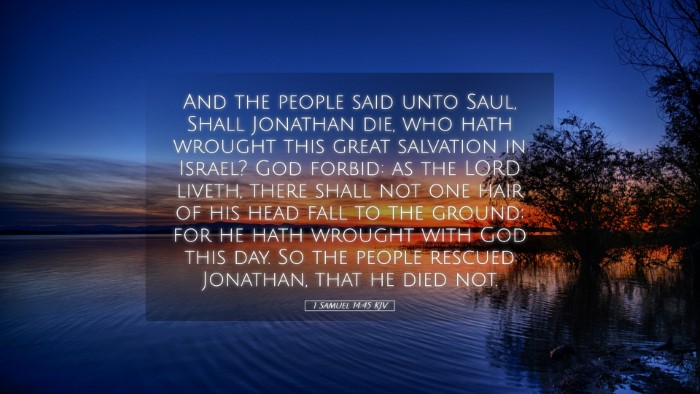Commentary on 1 Samuel 14:45
Bible Verse: "But the people said to Saul, 'Shall Jonathan die, who has accomplished this great salvation in Israel? Far from it! As the Lord lives, there shall not one hair of his head fall to the ground, for he has worked with God this day.' So the people rescued Jonathan, and he did not die."
Introduction
This verse within its context serves as a profound illustration of the dynamics of leadership, faith, and communal loyalty within the narrative of Israel’s history. It highlights the significance of personal valor and divine assistance in the life of Jonathan, as well as the protective instincts of the people towards him.
Contextual Overview
The events leading up to this moment are critical to understanding the gravitas of the situation. Jonathan, the son of King Saul, engaged in a bold act of faith and bravery against the Philistines, demonstrating remarkable trust in God's deliverance. His victory not only showcased his prowess but also brought about a significant salvation for Israel at a time when they were sorely pressed by their enemies.
Analysis of the Verse
Leadership and Responsibility
Albert Barnes notes that Saul's rash oath during the battle created a precarious situation that endangered Jonathan's life. It reflects a lack of foresight on Saul's part. A leader who imposes burdensome vows may inadvertently endanger his most valiant followers, suggesting a need for wisdom and discernment in leadership.
The Value of Loyalty
The people's immediate defense of Jonathan conveys deep loyalty and a recognition of his contributions. Matthew Henry emphasizes that the crowd's response indicates their understanding that Jonathan, by working 'with God,' was a significant instrument of their deliverance. Their defiance against Saul’s decree illustrates the importance of collective wisdom and unity in times of crisis.
The Role of Divine Providence
Adam Clarke reflects on the sovereignty of God throughout the narrative. He points out that Jonathan's successes were not merely due to his courage but empowered by divine providence. This reinforces the theological principle that God orchestrates events for His chosen instruments and that human actions, when aligned with divine intent, yield fruitful outcomes.
Thematic Insights
Faith and Advocacy
This verse demonstrates the theme of faith not just as a personal conviction but as a communal reality. In their collective push to save Jonathan, the people exhibited a form of advocacy rooted in their faith in God’s workings through Jonathan. It challenges contemporary readers to reconsider how they support and uplift those within their community who are faithfully serving God.
Consequences of Oaths
Saul's oath plays a pivotal role in this scenario. While it was intended to instill discipline, it arises as a potential source of folly. Barnes points out that while oaths hold great weight, leaders must also possess the humility to acknowledge when their commitments lead to unjust outcomes. This underlines the biblical principle that mercy and love often supersede rigid adherence to laws or vows.
Practical Applications
- For Pastors: This passage encourages church leaders to balance authority with compassion, ensuring that their directives do not inadvertently harm dedicated servants of God.
- For Students: It serves as a study in observing the layers of leadership and the implications of communal loyalty, urging students to critically evaluate the dynamics of influence in biblical narratives.
- For Theologians: The theological implications of divine providence in human affairs provide fertile ground for exploration regarding God's active involvement in historical events and individual lives.
- For Bible Scholars: The text invites deeper inquiry into the socio-political structures of ancient Israel, focusing on the interplay between civilian response and royal authority.
Conclusion
1 Samuel 14:45 encapsulates a profound moment of deliverance and underscores the deep connections between faith, community, and leadership. The efforts to save Jonathan highlight not only the communal respect for his role in God’s plan but also the necessity for leaders to lead with wisdom and humility. The insights from public domain commentaries enrich our understanding of the text, urging contemporary reflections on loyalty, authority, and divine purpose.


